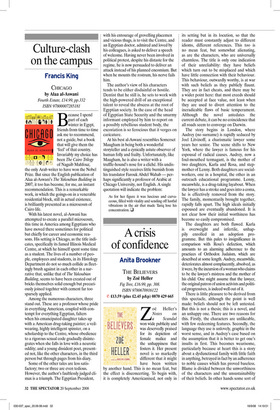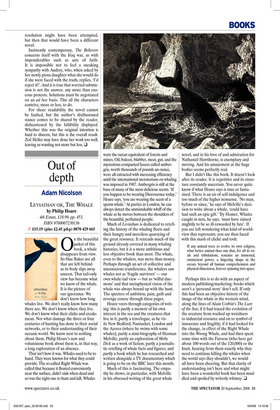A crisis of confidence
Anita Brookner
THE BELIEVERS by Zoë Heller Fig Tree, £16.99, pp. 308. ISBN 9780670916122 ✆ £13.59 (plus £2.45 p&p) 0870 429 665 Zoë Heller’s Zoë Heller’s Notes on a Scandal won wide publicity and was deservedly praised for its depiction of female malice and the unhappiness that fosters it. Her present novel is so markedly different that it might have been written by another hand. This is no mean feat, but the effect is disconcerting. To begin with, it is completely Americanised, not only in its setting but in its locution, so that the reader must constantly adjust to different idioms, different references. This too is no mean feat, but somewhat alienating, as are the characters, who are universally charmless. The title is only one indication of their unreliability: they have beliefs which turn out to be misplaced and which have little connection with their behaviour. This behaviour, outwardly worthy, is at war with such beliefs as they publicly flaunt. They are in fact cheats, and there may be a wider point here: that most creeds should be accepted at face value, not least when they are used to divert attention to the ineradicable flaws of basic temperament. Although the novel antedates the current debate, it can be no coincidence that all roads seem to converge on Darwin.
The story begins in London, where Audrey (no surname) is rapidly seduced by Joel Litvinoff, a charismatic lawyer some years her senior. The scene shifts to New York, where the lawyer is famous for his espousal of radical causes. Audrey, now a foul-mouthed termagant, is the mother of two daughters, Karla and Rosa, and stepmother of Lenny. Both daughters are socialworkers, one in a hospital, the other in an outreach educational programme. Lenny, meanwhile, is a drug-taking layabout. When the lawyer has a stroke and goes into a coma, he is effectively removed from the story. The family, momentarily brought together, rapidly falls apart. The high ideals initially espoused are eventually abandoned. It is not clear how their initial worthiness has become so easily compromised.
The daughters are both flawed. Karla is overweight and infertile, unhappily enrolled in an adoption programme. But this pales to insignificance in comparison with Rosa’s defection, which amounts to an alarming adherence to the practices of Orthodox Judaism, which are described at some length. Audrey, meanwhile, deteriorates almost complacently, absolved, as it were, by the incursion of a woman who claims to be the lawyer’s mistress and the mother of his child. One might assume that the lawyer, the original patron of union activists and political progressives, is indeed well out of it.
There is little pleasure to be derived from this spectacle, although the point is well made: beliefs should not be left untested. But this is not a thesis; this is a novel, and an unhappy one. There are two reasons for this. Firstly, the characters are unlikeable, with few redeeming features. Secondly, the language they use is unlovely, graphic in the worst sense, and in Audrey’s case based on the assumption that it is better to get one’s insults in first. This becomes wearisome, particularly because at heart this is a story about a dysfunctional family with little faith in anything, betrayed in fact by an adherence to noble causes which has proved baseless. Blame is divided between the unworthiness of the characters and the unsustainability of their beliefs. In other hands some sort of resolution might have been attempted, but then that would have been a different novel.
Insistently contemporary, The Believers concerns itself with the Iraq war, as with imponderables such as acts of faith. It is impossible not to feel a sneaking sympathy with Audrey, who, when asked by her newly pious daughter what she would do if she were faced with the truth, replies, ‘I’d reject it!’. And it is true that worried submission is not the answer, any more than raucous protests. Solutions must be negotiated on an ad hoc basis. This all the characters contrive, more or less, to do.
For sheer readability the novel cannot be faulted, but the author’s disillusioned stance comes to be shared by the reader, disheartened by the fallibility displayed. Whether this was the original intention is hard to discern, but this is the overall result. Zoë Heller may have done her work too well, leaving us wanting not more but less. ❑











































































 Previous page
Previous page